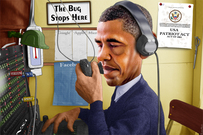| |  The Justice Department announced Monday that it has struck a plea deal with an FBI agent it says leaked information about the CIA’s ability to foil a bomb plot in Yemen. This is not a reason to celebrate. In fact, the Justice Deparment’s crowing about how its |
| | subpoena of Associated Press telephone logs led to this arrest and plea agreement are obscene. Freedom always comes with tradeoffs. In this country, we sometimes allow someone arrested for drug possession to go free because a court determines police, who may have pulled the suspect over for, say, speeding, lacked probable cause to search for drugs. This is because Americans historically have valued the Constitution’s guarantees of freedom from random government searches more than they have valued the false security of a police state. We allow people to shout horrible, obscene things at inopportune times — even if that involves protests near funerals — because the freedom to express ideas is more important than allowing someone in government to decide what can and cannot be said. And we allow the press to operate free of government control because allowing independent news sources to report on government actions, including abuses, is more important than the chance that some level of government efficiency will be compromised through disclosure. The arrest of Donald Sachtleben, a retired FBI agent who was a bomb technician, is about more than national security. Even in a nation with a tradition of press freedoms, governments and news organizations have cooperated from time to time. Sometimes, editors have agreed to hold stories when officials have made convincing cases of dangers to national security. In this case, the government did not notify the AP of its intent to obtain the phone records. There was no chance for negotiation or for the AP to challenge the subpoena. The information, involving calls made on 20 phone lines, was simply taken without AP’s knowledge. This was about sending a message. The administration says the message was to potential government leakers. As a practical matter, however, that message also keeps the media from performing its essential function of keeping government honest. "The goal is to stop people who have taken an oath to protect national security from disclosing secrets that harm it," former Justice Department spokesman Matt Miller told NPR earlier this year. But along the way, it also will stop people from reporting abuses and protecting the public’s right to know about a government that seems to be growing ever more secretive and more intrusive (NSA spying, anyone?). Admittedly, Sachtleben is not the perfect example of an altruistic public servant. He also has agreed to plead guilty to distributing child pornography, a crime disgusting enough to warrant whatever sentence he serves under both cases combined. But that doesn’t diminish the harm his arrest for leaking information has caused. Under President Obama, eight cases of government leaks have been prosecuted, which is five more than under all previous presidents combined, the New York Times reports. That is a disturbing legacy and a troubling precedent. |

 RSS Feed
RSS Feed

